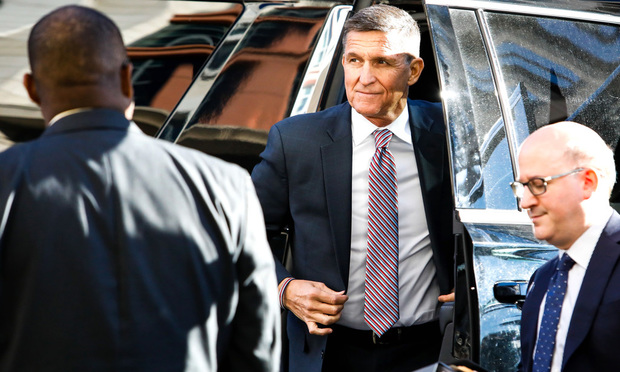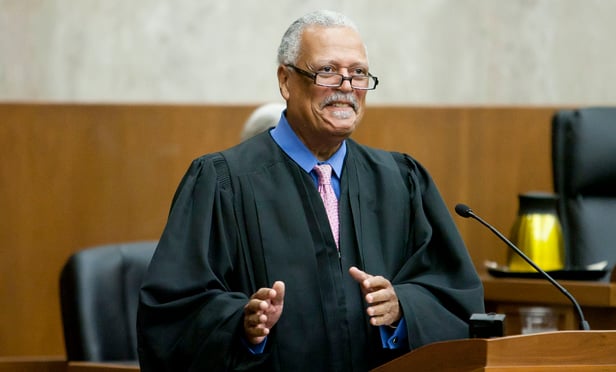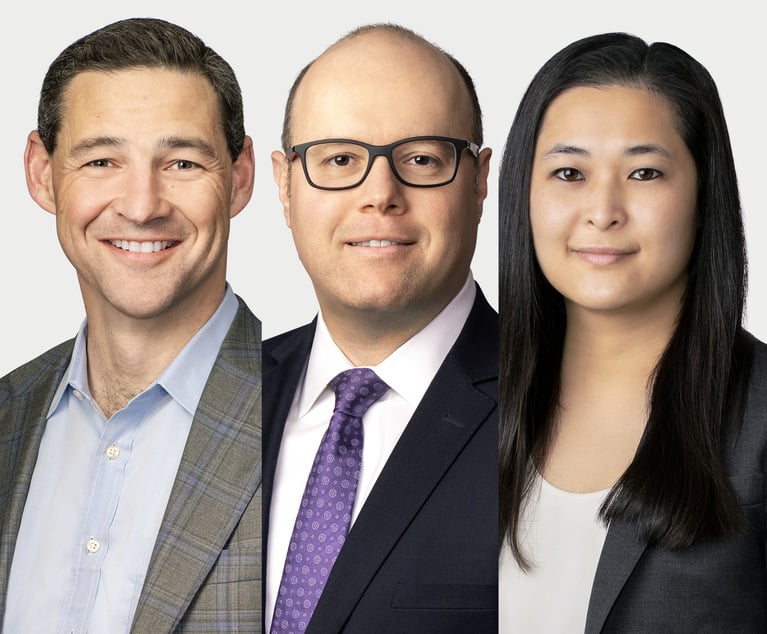Why Covington Is Constrained as Michael Flynn Flays His Former Defense Team
The Michael Flynn saga in Washington has opened a window into Covington & Burling's advocacy for the former Trump national security adviser, who is now trying to withdraw his guilty plea. Covington, meanwhile, says "bar rules limit our ability to respond publicly even to allegations of this nature, absent the client's consent or a court order."
March 02, 2020 at 03:03 PM
12 minute read
The original version of this story was published on National Law Journal
 Covington & Burling offices in Washington. Photo: Diego M. Radzinschi/ALM
Covington & Burling offices in Washington. Photo: Diego M. Radzinschi/ALM
Late in November 2017, just days before Michael Flynn pleaded guilty to lying to the FBI, Covington & Burling partner Rob Kelner had visions for a roadshow to seize on the law firm's representation of the former Trump national security adviser.
In an email to his law firm partners, Kelner sketched out a three-city tour, with client briefings in New York, Los Angeles and Washington addressing the Foreign Agents Registration Act, a decades-old law requiring the disclosure of political influence work for foreign powers. As part of his plea deal, Flynn would admit he "made material false statements and omissions" in foreign-agent filings related to his advocacy for Turkey.
"This may be a lot to bite off with the holidays coming up," wrote Kelner, the leader of Covington's election and political law practice group, "but we may as well strike when the iron is hot, and I think Flynn would be fine with that, since the chances of our getting paid for his case are looking grim."
Before long, Covington's representation of Flynn would flip from a perceived marketing asset to a public relations headache. In June 2019, Flynn fired his Covington lawyers, replacing them with a new team including Sidney Powell, a Fox News flamethrower and former federal prosecutor who had widely denounced Special Counsel Robert Mueller III's investigation.
It was a rare indignity for the prominent Washington law firm, and Flynn's new lawyers would only dial up the pressure. In recent weeks, as Flynn has pressed to withdraw his guilty plea, Powell has argued Covington failed him with ineffective legal counsel. The claims have so far gone unanswered, with Covington citing professional conduct rules that limit its ability to respond.
The episode has underscored the challenges law firms confront in addressing accusations from former clients. When engagements end badly, law firms remain bound under bar rules and legal ethics norms to preserve the tight seal around the confidences of former clients.
In the District of Columbia's bar rules, there is an exception allowing firms to open up for the limited purpose of defending themselves against malpractice or ineffective counsel claims. But even then, law firms face complex questions loaded with reputational considerations: Exactly when is it appropriate to begin mounting a self-defense? How far can that defense go? And what message do the arguments send to clients and the broader public?
Covington has answered only with a brief explanation of what has otherwise been reticence from the firm. Under bar rules, the firm said, it needs Flynn's consent or a court order to respond publicly to his claims.
In a recent court filing, the Justice Department asked the federal judge overseeing the case for an order confirming Flynn had effectively waived attorney-client privilege in claiming the law firm provided poor counsel. Any order affirming Flynn waived attorney-client privilege would free Covington to share records with the government for the limited purpose of defending itself.
"While Covington has indicated a willingness to comply with this request, it has understandably declined to do so in the absence of a court order confirming the waiver of attorney-client privilege," the Justice Department said. In a separate filing, Justice Department lawyers said such an order would "make certain and clear that counsel may take the necessary steps to vindicate their public reputation by addressing and defending against the defendant's claims of ineffective assistance of counsel."
Covington, in a statement, said "the bar rules limit our ability to respond publicly even to allegations of this nature, absent the client's consent or a court order. We will await the court's decision on this issue and will comply fully with any court order."
'The safer avenue'
Flynn has asserted his former Covington lawyers never told him FBI agents believed he had a "sure demeanor" and displayed no signs of deception during the White House interview at the heart of the false statements charge. If the agents' impression had been disclosed to him, Flynn said he never would have pleaded guilty in December 2017 to lying about his communications with Russia's top diplomat to the U.S. during the transition.
 Retired Army Lt. Gen. Michael Flynn, center, arrives for sentencing at federal court in Washington, with his then-attorney Robert Kelner, right, on Dec. 18, 2018. Photo: Diego M. Radzinschi/ NLJ
Retired Army Lt. Gen. Michael Flynn, center, arrives for sentencing at federal court in Washington, with his then-attorney Robert Kelner, right, on Dec. 18, 2018. Photo: Diego M. Radzinschi/ NLJAnother alleged shortcoming, Flynn's new lawyers said, was the "intractable" conflict of interest stemming from Covington's work on the foreign-agent filings whose veracity came into question. Flynn had been apprised of the potential conflict in 2017, according to a court filing, and agreed to stick with his Covington lawyers.
"Flynn's lawyer is playing with fire, because the odds are that if they're making specific allegations of how Covington misrepresented things, that will authorize Covington to respond. Many defendants think the best defense is a good offense. But Covington is not left without a way to defend itself," said Laurie Levenson, a legal ethics professor at Loyola Law School in Los Angeles. "The problem is this delay period, where everyone's speculating as to what happened."
In interviews, legal ethics experts said Covington has been wise to wait for a court order before responding to Flynn's claims.
The D.C. bar rules only allow for the release of information "reasonably necessary" to address a past client's legal claims or disciplinary charges. The rules permit lawyers to respond to allegations without a court order or waiting for formal proceedings to begin. But in that scenario, the rules put tight limits on the disclosure of client information, requiring lawyers to restrict access to "the tribunal or other persons having a need to know it."
Without a court order, the professional conduct experts said, law firms run the risk of testing the boundaries of the rule and exposing themselves to bar discipline or even a malpractice claim.
"Practically, the prudent course was to get a court order, because the last thing Covington needs is to be under the gun themselves. They're already being accused of ineffective assistance of counsel," Levenson said. "They don't want to add some allegation of breaching attorney-client privilege or confidences."
In waiting for a court order, "you avoid the risk that you've gone too far and violated the rule," said Bruce Green, a legal ethics professor at Fordham University School of Law. "There's no downside to that," he said.
Green said that, from a reputational standpoint, silence can be a law firm's best defense. "They don't want to have a reputation for betraying their clients' confidences to promote their own self-interest," he said.
In 2013, a legal ethics committee of the D.C. bar issued an opinion stating that lawyers do not need judicial approval before making "reasonably necessary" disclosures to respond to former clients' claims of ineffective counsel. The opinion departed from the more restrictive model rule of the American Bar Association, which allows for the disclosure of client information only in the context of an actual or contemplated proceeding.
The D.C. bar committee recognized that its approach left room for a range of responses to ineffective counsel allegations.
"At one end of the spectrum are lawyers who are angered by the claim and eager to beat it back. Attorneys have a reputational interest in having [ineffective assistance of counsel] claims defeated. They may also fear future civil claims by the former client," the opinion stated. At the other end, the bar committee said, are lawyers who withdraw after spotting an issue with their work, refer clients to other lawyers and cooperate with the new counsel.
"If new counsel tells them that the client objects to any voluntary disclosure to prosecutors, they do not disclose until a court requires them to do so," the opinion states. "Between those extremes are understandably concerned lawyers who do not want to jeopardize their licenses, their reputations, or their ability to continue doing defense work but who may not want to assist the prosecution against a former client."
After Flynn fired Covington, the firm turned over the entirety of its file. At the time, the firm said in a court filing that it takes "very seriously the obligation to protect the interests of a client in connection with any termination of a representation." The file included interview notes, legal and fact memos, documents obtained from Flynn and others, and other communication.
A window into Covington
Prosecutors and Powell recently said they are optimistic about reaching an agreement on the waiver of attorney-client privilege and authorization for Covington to disclose information related to Flynn. The two sides plan to submit a joint proposal by March 6 to U.S. District Judge Emmet Sullivan of the District of Columbia.
Powell told The National Law Journal it will be up to Covington to decide what information is "reasonably necessary" to disclose about its work for Flynn.
"Ultimately, no matter what Judge Sullivan might do, Covington alone has to choose what is reasonably necessary to disclose under the rules and be responsible for it," she said.
Since taking up Flynn's case, Powell has struggled to make headway with her allegations of prosecutorial misconduct. In December, Sullivan rejected her claims that prosecutors withheld favorable evidence from Flynn and entrapped him in an interview concerning his contacts with Sergey Kislyak, the former Russian ambassador to the U.S.
"The court summarily disposes of Mr. Flynn's arguments that the FBI conducted an ambush interview for the purpose of trapping him into making false statements and that the government pressured him to enter a guilty plea," Sullivan wrote his ruling. "The record proves otherwise."
 U.S. District Judge Emmet Sullivan of the District of Columbia. Photo: Diego M. Radzinschi/ALM
U.S. District Judge Emmet Sullivan of the District of Columbia. Photo: Diego M. Radzinschi/ALMFlynn's legal maneuvering has provided a rare window into negotiations between a major U.S. law firm and federal prosecutors. Notes, emails and other records related to the ill-fated representation showed some of the behind-the-scenes action surrounding Flynn's guilty plea.
In one email, Kelner appeared struck by the Justice Department's zeal in demanding disclosures of Flynn's lobbying work for Turkey.
"Heather Hunt has kind of been all over us," Kelner wrote in a February 2017 email, referring to the then-chief of the Justice Department unit tasked with receiving disclosures of registered foreign agents.
"We've never seen her this engaged in any matter (ever)," he added.
In another email, sent weeks after the guilty plea, Kelner shared discouraging news with his partners: the Israeli government had decided not to hire the firm for Foreign Agents Registration Act advice.
"While our work on the Flynn matter seems to have initially drawn them to us, the Prime Minister's Office apparently saw things differently and decided that our Flynn representation was a minus and not a plus," Kelner said in an email to fellow partners including James Garland and Tim Hester, the firm's chairman at the time. "They were worried about optics."
Other emails show Kelner, Covington partner Stephen Anthony and others at the firm receiving praise for negotiating Flynn's guilty plea. The deal appeared to position Flynn for a sentence without prison time, with prosecutors initially backing his request for leniency. More recently, prosecutors have said that Flynn should receive up to six months in prison, although they have also said that a sentence of probation would be "reasonable."
In a November 2017 email, after Covington sent him a detailed explanation of a potential conflict of interest stemming from the firm's work on his FARA filings, Flynn replied with glowing praise for the defense lawyers and consented to proceeding with them.
"As we've discussed, Lori and I are very confident in you and Rob (and the rest of the team) and, we've felt from day one, Covington, with both of your leadership and guidance, have counseled beyond what we could imagine," Flynn wrote, referring to his wife, in an email to Anthony. "We're good going forward with you all and very much trust that you will continue to guide us through this difficult time."
Kelner, in another email from that same month, shared draft talking points for a call with a pair of Mueller prosecutors. "There are no circumstances under which he would plea to a felony offense," Kelner wrote in an email to Covington colleagues.
Flynn would plead guilty a month later.
Read more:
Who Is Jeff Jensen, Ex-Husch Blackwell Partner and Barr's Point Person on Flynn Case?
Michael Flynn Wants to Scrap His Guilty Plea Ahead of Sentencing
'The Record Proves Otherwise': Judge Knocks Down Mike Flynn's 'Ambush' Claims
Flynn's Ex-Covington Lawyers Defend Conduct Amid Court Scrutiny
Judge Sullivan Has Read Some of Sidney Powell's Book (Or at Least the Part About Him)
This content has been archived. It is available through our partners, LexisNexis® and Bloomberg Law.
To view this content, please continue to their sites.
Not a Lexis Subscriber?
Subscribe Now
Not a Bloomberg Law Subscriber?
Subscribe Now
NOT FOR REPRINT
© 2025 ALM Global, LLC, All Rights Reserved. Request academic re-use from www.copyright.com. All other uses, submit a request to [email protected]. For more information visit Asset & Logo Licensing.
You Might Like
View All
Some Thoughts on What It Takes to Connect With Millennial Jurors

Litigators of the Week: A Directed Verdict Win for Cisco in a West Texas Patent Case

With DEI Rollbacks, Employment Lawyers See Potential For Targeting Corporate Commitment to Equality
7 minute readLaw Firms Mentioned
Trending Stories
- 1Midsize Firm Bressler Amery Absorbs Austin Boutique, Gaining Four Lawyers
- 2Bill Would Allow Californians to Sue Big Oil for Climate-Linked Wildfires, Floods
- 3LinkedIn Suit Says Millions of Profiles Scraped by Singapore Firm’s Fake Accounts
- 4Supreme Court Agrees to Hear Lawsuit Over FBI Raid at Wrong House
- 5What It Takes to Connect With Millennial Jurors
Who Got The Work
J. Brugh Lower of Gibbons has entered an appearance for industrial equipment supplier Devco Corporation in a pending trademark infringement lawsuit. The suit, accusing the defendant of selling knock-off Graco products, was filed Dec. 18 in New Jersey District Court by Rivkin Radler on behalf of Graco Inc. and Graco Minnesota. The case, assigned to U.S. District Judge Zahid N. Quraishi, is 3:24-cv-11294, Graco Inc. et al v. Devco Corporation.
Who Got The Work
Rebecca Maller-Stein and Kent A. Yalowitz of Arnold & Porter Kaye Scholer have entered their appearances for Hanaco Venture Capital and its executives, Lior Prosor and David Frankel, in a pending securities lawsuit. The action, filed on Dec. 24 in New York Southern District Court by Zell, Aron & Co. on behalf of Goldeneye Advisors, accuses the defendants of negligently and fraudulently managing the plaintiff's $1 million investment. The case, assigned to U.S. District Judge Vernon S. Broderick, is 1:24-cv-09918, Goldeneye Advisors, LLC v. Hanaco Venture Capital, Ltd. et al.
Who Got The Work
Attorneys from A&O Shearman has stepped in as defense counsel for Toronto-Dominion Bank and other defendants in a pending securities class action. The suit, filed Dec. 11 in New York Southern District Court by Bleichmar Fonti & Auld, accuses the defendants of concealing the bank's 'pervasive' deficiencies in regards to its compliance with the Bank Secrecy Act and the quality of its anti-money laundering controls. The case, assigned to U.S. District Judge Arun Subramanian, is 1:24-cv-09445, Gonzalez v. The Toronto-Dominion Bank et al.
Who Got The Work
Crown Castle International, a Pennsylvania company providing shared communications infrastructure, has turned to Luke D. Wolf of Gordon Rees Scully Mansukhani to fend off a pending breach-of-contract lawsuit. The court action, filed Nov. 25 in Michigan Eastern District Court by Hooper Hathaway PC on behalf of The Town Residences LLC, accuses Crown Castle of failing to transfer approximately $30,000 in utility payments from T-Mobile in breach of a roof-top lease and assignment agreement. The case, assigned to U.S. District Judge Susan K. Declercq, is 2:24-cv-13131, The Town Residences LLC v. T-Mobile US, Inc. et al.
Who Got The Work
Wilfred P. Coronato and Daniel M. Schwartz of McCarter & English have stepped in as defense counsel to Electrolux Home Products Inc. in a pending product liability lawsuit. The court action, filed Nov. 26 in New York Eastern District Court by Poulos Lopiccolo PC and Nagel Rice LLP on behalf of David Stern, alleges that the defendant's refrigerators’ drawers and shelving repeatedly break and fall apart within months after purchase. The case, assigned to U.S. District Judge Joan M. Azrack, is 2:24-cv-08204, Stern v. Electrolux Home Products, Inc.
Featured Firms
Law Offices of Gary Martin Hays & Associates, P.C.
(470) 294-1674
Law Offices of Mark E. Salomone
(857) 444-6468
Smith & Hassler
(713) 739-1250







